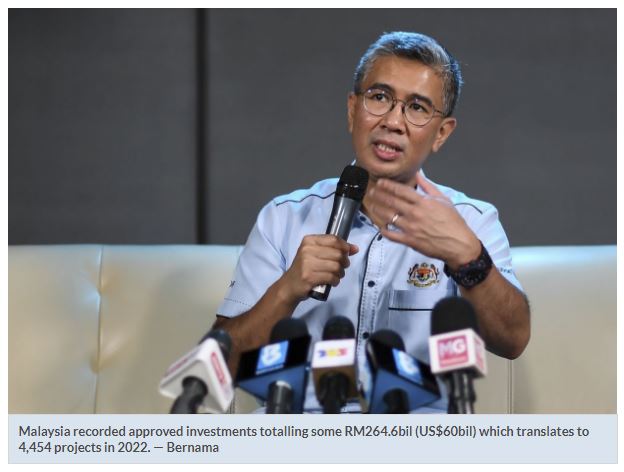Malaysia: Improving ease of doing business
PETALING JAYA: The government is taking very seriously the task to improve the country’s ease of doing business perception and reputation among investors.
This improved reputation would help the country more easily court and gain additional foreign direct investments (FDI) moving forward, which would then indirectly spillover to increased domestic direct investments (DDIs) as well.
According to the Minister of International Trade and Industry (Miti) Tengku Datuk Seri Zafrul Abdul Aziz, the task to improve the country’s ease of doing business perception among investors is being handled by the ministry.
“It has been mentioned by the Prime Minister who wants to ensure this ease of doing business is addressed and the Special Task Force to Facilitate Business (Pemudah) under Miti has been tasked to look into this matter very seriously,” Zafrul said at the Malaysian Investment Development Authority (Mida) Annual Media Conference 2023.
“This needs a whole of nation approach where Miti and Mida together with the other government ministries and agencies and not forgetting also the state governments and local councils get in the act.
“All these have to work together and Pemudah will be coordinating this where Miti would spearhead this as the secretariat for Pemudah,” he added.
Prime Minister and Finance Minister Datuk Seri Anwar Ibrahim recently was reported as saying that one of the focuses by the government going forward is to ensure there is improved ease of doing business in Malaysia.
Among areas that would be improved are the procedures for doing business to reduce bureaucracy, including bringing together all functions such as immigration, incentives, land approval and others together which would be simplified and managed in an organised manner.
Meanwhile, Malaysia recorded approved investments totalling some RM264.6bil (US$60bil) which translates to 4,454 projects in 2022.
Zafrul said this is the second largest in the history of investments in the country after 2021 given there were big investments in that year which skewed the figures upwards.
“There were two large one-off investments that happened in 2021 from Intel and China’s Risen Energy Co Ltd,” he said.
The services sector is the main recipient of these investments totaling RM154bil, followed by a RM84.3bil boost into the manufacturing sector and RM26.3bil in the primary sector, Mida said in its statement.
FDIs remained the major contributor to the total approved investments at 61.7% or RM163.3bil while DDI contributed 38.3% or RM101.3bil.
China led the way in total approved investments into Malaysia with RM55.4bil, followed by the United States at RM29.2bil, the Netherlands RM20.4bil, Singapore RM13.5bil and Japan RM11.4bil.
The top states in the country which had received these investment inflows are in order – Johor RM70.6bil, Selangor RM60.1bil, Sarawak RM28.2bil, Kuala Lumpur RM25bil and Penang RM16.3bil.
The country’s services sector recorded inflows of RM154bil which represents a 58.8% increase over the previous year’s investments of RM97bil.
This is expected to create 63,464 new jobs, Mida said.
The information and communications sub-sector dominated the services sector, with approved investments worth RM84.7bil, or 55%.
There were five projects that were related to Information and Communication Technology services, including data centres and cloud computing services, with an investment value of RM72.4bil or 85.5% of the approved investments in the information and communication subsector, it said.
Meanwhile, Zafrul said an increase in the FDI would also help boost the DDI in terms of promoting downward supply chain investments.
“If you look at the breakdown of the figures, FDI and DDI continues to improve. In terms of contribution, FDI is larger but one must not forget the correlation between the FDI and DDI,” Zafrul said.
“For example for larger companies that comes in such as Intel. The machinery supply of raw materials or even services comes from investors of Malaysian companies. So there is a positive spillover there. Moving forward, the focus would be on increasing both fronts as well,” he added.
In his speech, Zafrul said digitalisation efforts have helped Malaysia to be one of Asia’s most technologically advanced nations which helps the country be an attractive destination for both domestic and international investors.
“Digital enablers such as the Internet of Things, artificial intelligence and cloud computing have become crucial for expanding businesses and transforming industries,” he said.
“Moving forward, Miti and its agencies, such as Mida, will continue to work hard to attract high-quality digital investments, generate more value and opportunities for growth through data and cloud-based technologies that would in turn create high-paying jobs for Malaysians,” Zafrul added.
However, he also noted that the investment outlook for 2023 may be impacted by the moderation that is expected in global economic growth.
“Investment decisions are a little different from trade as it is based on longer-term plans. The country’s fundamentals are key,” he said.
Meanwhile, Mida said it has a number of promising potential investments that are expected to flow in totaling RM14.6bil so far.
“The manufacturing sector has 31 projects with a potential investment of RM10.6bil, while the services sector has 218 projects with a potential investment of RM4bil,” it said.
Source: https://www.thestar.com.my/business/business-news/2023/03/09/improving-ease-of-doing-business


 English
English





